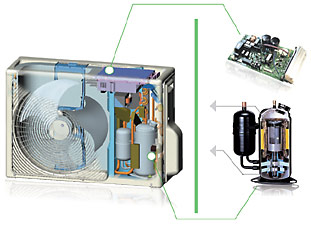When it comes to cooling our homes or offices, air conditioners are indispensable. However, traditional air conditioners can be quite energy-intensive, leading to higher electricity bills and environmental impact. This is where inverter technology comes in to revolutionize the way air conditioners operate. In this article, we’ll delve into the science of air conditioner inverters, how they work, and why they are more efficient than traditional air conditioners.
Understanding the Basics of Air Conditioning
Before we explore the intricacies of inverter technology, it’s important to understand the basic principles of air conditioning. Traditional air conditioners operate using a compressor that cycles on and off to maintain the desired room temperature. This means that when the temperature strays from the set point, the compressor switches on at full capacity until the desired temperature is reached, then shuts off until the temperature rises again.

Credit: www.amazon.com
How Air Conditioner Inverters Work
Unlike traditional air conditioners, inverter air conditioners utilize a variable speed compressor. This means that the compressor does not need to cycle on and off to maintain the set temperature. Instead, it operates at varying speeds, constantly adjusting its output to meet the cooling demands. The inverter technology allows the compressor to draw only the power it needs to maintain the set temperature, making it significantly more energy-efficient.
Key Components Of An Air Conditioner Inverter System
An air conditioner with inverter technology consists of several key components that work together to optimize cooling efficiency. These components include:
| Component | Function |
|---|---|
| Compressor | Variable speed compressor adjusts its output based on cooling demands. |
| DC Inverter | Converts AC power to DC, allowing the compressor to operate at varying speeds. |
| Refrigerant Flow Control | Controls the flow of refrigerant to match the cooling needs, ensuring optimal efficiency. |
The Science Behind Inverter Technology
At the heart of air conditioner inverter technology is the ability to modulate the speed of the compressor. By using a variable frequency drive, the inverter adjusts the electrical frequency to control the speed of the compressor motor. This dynamic control allows the system to continuously match the cooling output to the current demand, resulting in precise temperature control and minimal energy wastage.
Advantages Of Air Conditioner Inverter Systems
There are several compelling reasons why inverter air conditioners are gaining popularity over traditional units. Some of the key advantages include:
- Energy Efficiency: By eliminating the need for the compressor to cycle on and off, inverter air conditioners consume significantly less energy, leading to reduced electricity bills.
- Precise Temperature Control: The ability to modulate compressor speed allows for more accurate and consistent temperature control, ensuring optimal comfort levels.
- Quiet Operation: Inverter technology results in quieter operation as the compressor does not have to start and stop abruptly.
- Extended Lifespan: The reduced strain on the compressor and other components can lead to a longer lifespan for inverter air conditioners.
Conclusion
As energy efficiency and environmental impact continue to be key considerations in consumer choices, air conditioner inverter technology stands out as a significant advancement in cooling systems. By optimizing energy usage and providing precise temperature control, inverter air conditioners offer a compelling solution for residential and commercial cooling needs. As this technology evolves, we can expect even greater efficiency and innovation in the field of air conditioning.

